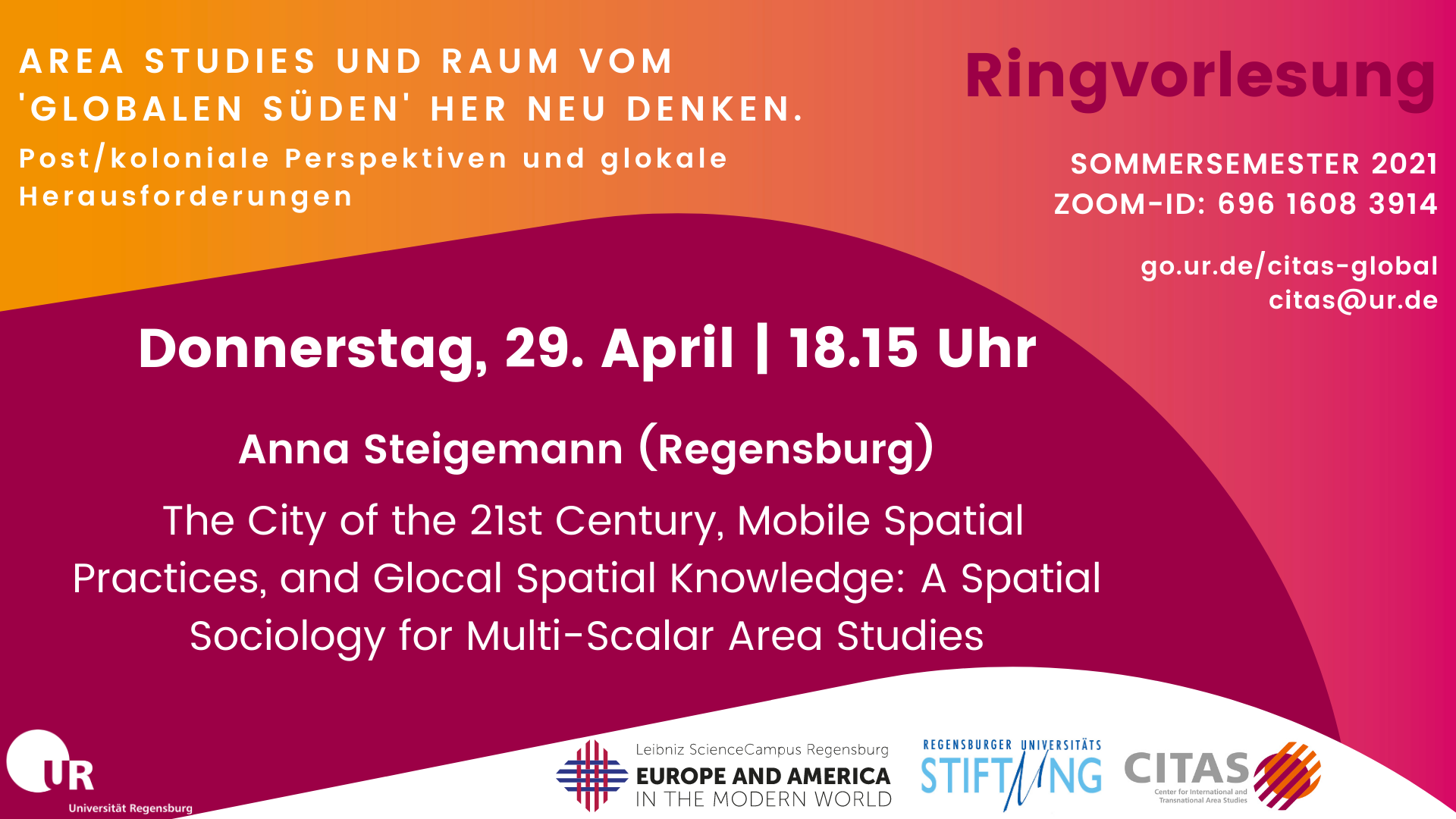Lecture Series: The City of the 21st Century, Mobile Spatial Practices, and Glocal Spatial Knowledge (Anna Steigemann)
Anna Steigemann (Regensburg) explores how the twenty-first-century city, a symbol of globality, mobility and inequalities, can be more effectively conceptualized and theorized when viewed through the lens of "the South".
The City of the 21st Century, Mobile Spatial Practices, and Glocal Spatial Knowledge: A Spatial Sociology for Multi-Scalar Area Studies
The City of the 21st century is characterized by globalization, translocalism, and multiple time-space entanglements. Increasing social and spatial inequality, migration and new mobilities, the global financial crisis, and environmental destruction are among the major global developments of the recent years that increasingly shape local social life and spatializing processes. Simultaneously, cities and regions are also the arenas for local negotiation and management of these global processes and challenges. But the city of the 21st century is also a city ‘of the South,’ where these processes and challenges have been the norm for decades and where important concepts and theories originate that help to explain and negotiate this processes, also in the global North.
This lecture thus provides an introduction to how critical Area Studies could embrace the so-called global South as the epicenter of urbanism and of new glocal temporal-spatial entanglements. It provides a starting point for discussing how a knowledge transfer of ‘theories of the South’ to the so-called global North helps to explain many socio-spatial transformation processes there.
The second part of the lecture focuses on refugees, as the most mobile social groups of the 21st century, and their spatial practices. The analysis of their socio-spatial transformation, trying to make themselves at home in new places of asylum, reveals important insights into how global processes affect local social and spatial processes and vice versa. Hence, with the example case of Syrian refugees’ spatial practices and appropriation processes in Berlin, the lecture argues for new approaches for multi-perspective, multi-scalar, and critical Area Studies that consider spatial and social change not as isolated and hermetically sealed off from other disciplines, but rather as a complex, multidisciplinary, highly dynamic, globally informed and locally situated process.
Die Stadt des 21. Jahrhunderts, mobile Raumpraktiken und glokales Raumwissen: Eine Raumsoziologie für multiskalare Area Studies
Die Stadt des 21. Jahrhunderts ist von Globalisierung, Translokalismus und multiplen Zeit-Raum-Verflechtungen geprägt. Zunehmende soziale und räumliche Ungleichheit, Migration und neue Mobilitäten, die globale Finanzkrise und Umweltzerstörung gehören zu den bedeutendsten globalen Entwicklungen der letzten Jahre, die zunehmend das lokale Sozialleben und Verräumlichungsprozesse prägen. Gleichzeitig sind Städte und Regionen auch die Arenen für die lokale Verhandlung und das Management dieser globalen Prozesse und Herausforderungen.
Aber die Stadt des 21. Jahrhunderts ist auch eine Stadt ‚des Südens‘, wo diese Prozesse und Herausforderungen seit Jahrzehnten die Norm sind und wo wichtige Konzepte und Theorien herkommen, die dabei helfen, diese Prozesse—auch im globalen Norden—zu erklären und auszuhandeln. Dieser Vortrag dient daher als Einführung in Wege, wie kritische Area Studies den sogenannten globalen Süden als Epizentrum von Urbanismus and neuen glokalen zeitlich-räumlichen Verflechtungen aufgreifen könnten. Er bietet einen Ansatzpunkt, um zu diskutieren, wie ein Wissenstransfer von ‚Theorien des Südens‘ an den sogenannten globalen Norden dabei hilft, viele sozioräumliche Transformationsprozesse dort zu erklären.
Der zweite Teil des Vortrags konzentriert sich auf Flüchtlinge als mobilste soziale Gruppe des 21. Jahrhunderts und deren Raumpraktiken. Die Analyse ihrer sozioräumlichen Transformation beim Versuch, sich ein neues Zuhause an ihren Zufluchtsorten aufzubauen, offenbart wichtige Einblicke darin, wie globale Prozesse lokale soziale und räumliche Prozesse beeinflussen und umgekehrt. Daher argumentiert der Vortrag am Beispiel der Raumpraktiken und Aneignungsprozesse von syrischen Geflüchteten in Berlin für neue Ansätze für multiperspektivische, multiskalare und kritische Area Studies, die räumliche und soziale Veränderungen nicht als isoliert und hermetisch abgeriegelt von anderen Disziplinen betrachten, sondern als komplexen, multidisziplinären, hochdynamischen, global informierten und lokal situierten Prozess.
Anna Steigemann is Acting Professor for Sociological Dimensions of Space at the University of Regensburg. Her research interests include migration, social inequality, and mobility.
When? Thursday, 29 April 2021, 18:15 CET
Where? Online via Zoom, https://uni-regensburg.zoom.us/j/69616083914, Meeting ID: 696 1608 3914
The lecture series "Rethinking Area Studies and Space from the 'Global South'? Post/Colonial Perspectives and Glocal Challenges" offers a multiperspectival reconceptualization of area studies and relevant concepts of space in dialog with the 'Global South'. It is organized together with CITAS. Find the full programm here.

